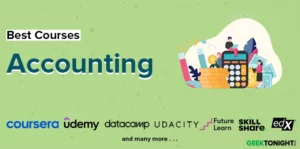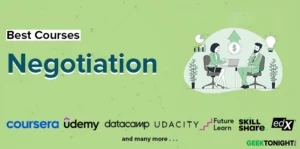Do you want to advance your career with DevOps? DevOps is the process of integrating software development and IT operations and provide companies to work efficiently. With the growing demand for automated and cloud-based solutions, DevOps is getting more popular among companies to successfully develop and deploy applications. Also, it is the best tool to maintain smooth communication between teams. The Best DevOps Courses in 2024 that are listed below may help you gain relevant experience and attract more career opportunities.
Why is it important to learn DevOps?
DevOps is revolutionizing the software development process for companies and saving them from conflict between development and operations teams. It increases the turnaround time (TAT) for the team and resolves any production issue that further results in improving customer experience.
According to BLS, the growth rate of DevOps jobs is growing by 22% each year, between 2022 and 2030. Furthermore, the average salary for DevOps roles is $138,671 per annum as per the survey from Glassdoor. With the increasing complexity of technology, companies need people who can manage and automate processes, and DevOps is the perfect fit for that job.
Whether you want to enter the IT industry or interested in DevOps, the Best Devops Courses help you to achieve whatever goals you have.
Table of Content
- 1 Best DevOps Courses, Certification, Tutorials, Training, Classes Online
- 1.1 Become a Cloud DevOps Engineer [Udacity]
- 1.2 DevOps Beginners to Advanced | Decoding DevOps with Projects [Udemy]
- 1.3 DevOps Culture and Mindset [Coursera]
- 1.4 DevOps , CI/CD(Continuous Integration/Delivery for Beginners [Udemy]
- 1.5 Learn DevOps: The Complete Kubernetes Course [Udemy]
- 1.6 Continuous Delivery & DevOps [Coursera]
- 1.7 Learn DevOps: Infrastructure Automation With Terraform [Udemy]
- 1.8 Jenkins, From Zero To Hero: Become a DevOps Jenkins Master [Udemy]
- 1.9 Ansible for the Absolute Beginner – Hands-On – DevOps [Udemy]
- 1.10 Architecting with Google Compute Engine Specialization [Coursera]
- 2 FAQ
Our product recommendations are unbiased and based on an independent review process. We may receive a commission for links to recommended partners. See our advertiser disclosure for more information.
Best DevOps Courses, Certification, Tutorials, Training, Classes Online
- Best Overall Become a Cloud DevOps Engineer [Udacity]
- Best for Beginner DevOps Beginners to Advanced | Decoding DevOps with Projects [Udemy]
- Best for Basics DevOps Culture and Mindset [Coursera]
- Best for CI/CD DevOps , CI/CD(Continuous Integration/Delivery for Beginners [Udemy]
- Best for Kubernetes Learn DevOps: The Complete Kubernetes Course [Udemy]
- Best for Automation Learn DevOps: Infrastructure Automation With Terraform [Udemy]
- Best for Jenkins Jenkins, From Zero To Hero: Become a DevOps Jenkins Master [Udemy]
- Best for Ansible Ansible for the Absolute Beginner – Hands-On – DevOps [Udemy]
- Best for Architecting Architecting with Google Compute Engine Specialization [Coursera]
Become a Cloud DevOps Engineer [Udacity]
This DevOps program is the best way to start your career as a DevOps Engineer. You’ll gain the skills required to become part of the growing Cloud DevOps field. The DevOps Certification will teach you the fundamentals of building CI/CD pipelines, monitoring, and logging.
Course Instructor
The Udacity Cloud DevOps Engineer Program will be taught by the best instructors – Justin Lee, Byron Sommardahl, Kesha Williams, and Carlos Rivas. As an expert in the Cloud field, each instructor will focus on building the confidence and skills needed to become a DevOps engineer.
What you’ll learn
The Udacity DevOps Program is divided into 5 courses, namely:
- Introduction: This course will help you gain familiarity with content and some tips to succeed.
- Cloud Fundamentals: This course will discuss the basics of cloud computing and get introduced to other services in the Cloud, including computer power, security, storage, networking, and management. You will learn about tools and services offered by Amazon Web Services(AWS) and deploy your first website to AWS.
- Deploy Infrastructure as Code(IAC): In this course, you will explore how to deploy this infrastructure using CloudFormation and AWS’ tool for Infrastructure as Code.
- Microservices using AWS and Kubernetes: With this course, you will understand how to build, deploy, and manage containerized applications using AWS and Kubernetes.
- Build CI/CD Pipelines, Monitoring, and Logging: Continuous Integration and Continuous Deployment will be explained in the course. GitHub Actions help you improve your knowledge of Cloud Formation and AWS.
Pros & Cons
Pros
- Interactive courses
- Well-explained concepts
- Fast response from Instructors
- Real-world projects
Cons
- Need more exercises and visual class
Key Highlights & Learning Objectives
- Learn about cloud computing, tools, and services offered by AWS, and how to deploy your first website to AWS.
- Able to turn your initial business requirements into a Cloud Architecture Diagram and deploy the architecture using CloudFormation.
- Build a strong foundation in containerization, microservices, and Kubernetes DevOps skills.
- Develop CI/CD technologies that automate developer-to-cloud communication while stretching for Continuous Delivery.
- Get hands-on projects to demonstrate your skills and get a completion certificate.
Who is it for?
The Online DevOps Certificate Program is designed for everyone who wants to learn about Cloud DevOps with no experience. Once you’ve completed all the courses, you will become an AWS Cloud DevOps Engineer.
Rating: 4.8/5
Duration: 4 months
DevOps Beginners to Advanced | Decoding DevOps with Projects [Udemy]
The DevOps Course Online begins with the basics of the command line and ends by teaching hands-on demonstrations of many tools & technologies. You will learn how to use various technologies in DevOps by setting up your own projects. In this Online Devops course, you will discover Bash Scripting, Cloud Computing, Version Control System, and Jenkins.
Course Instructor
Imran Teli is the instructor of the DevOps Tutorial Online from Udemy and has over 12 years of experience. He founded VisualPath IT Company, a leading software training organization that provides training on DevOps, Cloud Computing, Full Stack, Python, Data Warehousing, Testing, and many more.
Pros & Cons
Pros
- Valuable Information
- Comprehensive and Engaging Content
- Easy to grasp
Cons
- Need prior experience with tools
Key Highlights & Learning Objectives
- The DevOps Engineer Course includes 28 sections and 308 video lectures to get a complete understanding of DevOps from the ground up.
- An overview of Linux, AWS, Bash and Python scripting, Jenkins, Ansible, Docker, Kubernetes, Cloudformation, Terraform, and more.
- Understand how DevOps works with various technologies.
- Develop a solid understanding of DevOps processes, tools, and technologies in order to implement them.
- Get access to 17 articles, 81 downloadable resources, and 52 hours of on-demand video.
Who is it for?
The DevOps Tutorial is for beginners who want to learn DevOps and start a DevOps career. Once you’ve completed all sections, you will master the important topics required for projects and land an entry-level job in DevOps.
Rating: 4.6/5
Students Enrolled: 144,640
Duration: 53 hours
DevOps Culture and Mindset [Coursera]
The Basic DevOps Course can help you build a strong foundation of DevOps with a focus on culture and mindset. Learning culture and mindset can help you to improve relationships between developers and operations team members. This Coursera DevOps Training Certificate will also discuss strategies to manage, organize, and maintain quality of work by following key DevOps principles.
Course Instructor
The instructor, Courtney Kissler, will prepare you for the DevOps Culture and Mindset. She is the Vice President of Digital Platform Engineering at Nike and also spent 14 years at Nordstrom, with her last role being the Vice President of E-Commerce and Store Technologies.
What you’ll learn
The DevOps Tutorial is divided into 4 modules, including:
- Introduction to DevOps: The first week’s module will discuss major DevOps principles such as Kata, the A3 problem-solving method, and the Westrum Typology.
- Working with DevOps Mindset: In this module, instructors will explain loosely coupled architecture to facilitate high-performing organizations. Also, learn the strategies for managing risk and unplanned work in a DevOps environment.
- Organized with DevOps: This module will teach how to manage the work using different organizational structures in DevOps.
- Speed Up Time to Market: In this last week’s module, you will understand how to use specific strategies for increasing time to market. Gain a deep understanding of the CI/CI pipeline including, continuous delivery, configuration management, continuous integration, and testing.
Pros & Cons
Pros
- Great introduction
- Clear and concise content
- Use real-life examples
Cons
- Need more exercises
Key Highlights & Learning Objectives
- Discuss various organizational models and structures that companies in their DevOps transformations use.
- Learn about value stream mapping and ensuring continuous workflow.
- Learn key ideas and tactics to improve both time-to-market and increase the value delivered for your customers.
- Identify and explain different organizational structures typically used in DevOps to manage work
- Able to create a value stream map and discuss continuous flow.
- Gain access to 30+ videos, 3 reading materials, 4 quizzes to practice what you’ve learned and certificate of completion
Who is it for?
If you want to change your career to DevOps Engineer, the DevOps Training Certificate Online is a perfect choice. You don’t need any experience in DevOps to enroll. When you complete the course, you will feel confident in applying tactics to improve work culture and mindset in your own organization.
Rating: 4.7/5
Students Enrolled: 73,126
Duration: 3 Weeks, 4 hours/week
DevOps , CI/CD(Continuous Integration/Delivery for Beginners [Udemy]
The DevOps Training Course will give a clear picture of CI / CD and DevOps. You will understand how to use CI / CD and DevOps and find out the pain points in the old software development model. About 90% of the course is illustrated, and the remaining 10% consists of crisp bullet point slides to learn easily.
Course Instructor
The Udemy DevOps Training will be taught by John Honai, a passionate teacher and a computer engineer. He has worked as a programmer, a software designer, an IT operations analyst, and a Systems Architect. He has experience in all aspects of IT systems, including servers, integrations, and deployments to Enterprise Infrastructure.
Pros & Cons
Pros
- Clear explanation
- Easy to understand
- Informative and Interesting
Cons
- Require practical experiences
Key Highlights & Learning Objectives
- Understand the basics of Continuous Integration (CI), Continuous Delivery, and Continuous Deployment (CD), as well as DevOps.
- Analyze how CI/CD/DevOps alleviated the pain points of the traditional Software Development Life Cycle.
- Discover how CI/CD/DevOps can improve revenue and time-to-market.
- Explore how CI, CD, and DevOps evolved and build a solid foundation for understanding implementation and tools in more detail.
- Learn to catch bugs early and increase the quality of our software products.
Who is it for?
The Beginner DevOps Course is for software architects, developers, analysts, and folks to get crisp explanations of CI/CD. Once you’ve done so, you can apply continuous integration, continuous delivery, and continuous deployment to modernize the software development lifecycle.
Rating: 4.4/5
Students Enrolled: 121,643
Duration: 1 hours
Learn DevOps: The Complete Kubernetes Course [Udemy]
This DevOps Training Online is the best way to understand how to deploy, use, and maintain your applications on Kubernetes. You will learn how to create apps in containers using docker and set up your cluster on your desktop or the Cloud using AWS. In this DevOps Course, you will explore the real power of Kubernetes.
Course Instructor
This DevOps Training Online is the best way to understand how to deploy, use, and maintain your applications on Kubernetes. You will learn how to create apps in containers using docker and set up your cluster on your desktop or the Cloud using AWS. In this DevOps Course, you will explore the real power of Kubernetes.
Pros & Cons
Pros
- Well-explained concepts
- Very enjoyable and instructive
- Informative and well-structured
- Comprehensive
Cons
- Fast pace
- Familiarity with AWS requires
Key Highlights & Learning Objectives
- The Udemy Kubernetes with DevOps Course includes 14 sections and 146 video lectures.
- Learn to install and configure Kubernetes and set up your cluster using Docker Client using Kubernetes
- Gain an understanding of how to use Health Checks, Secrets, ConfigMaps, and placement strategies.
- Deploy a Cassandra cluster on Kubernetes using StatefulSets.
- Discover how to write your Helm charts for your applications and deploy your own Helm Charts using Jenkins
- Learn to install Kubeless to run functions on Kubernetes and deploy a service mesh using Istio on Kubernetes.
- Full lifetime access to 2 practice tests, 1 article, 1 downloadable resource, and 14 hours of on-demand video session.
Who is it for?
Learn DevOps with the Complete Kubernetes Course Online on Udemy. It is crafted for those who want to understand how to use Kubernetes on AWS. You must have a basic knowledge of dev/ops/cloud/Linux/networks and AWS. Kubernetes is a well-sought skill by companies, and learning DevOps can help you run and manage your containerized applications. If you want to develop a deep understanding of Kubernetes, check the list of Best Kubernetes Courses.
Rating: 4.4/5
Students Enrolled: 134,110
Duration: 14 hours
Continuous Delivery & DevOps [Coursera]
The DevOps Coursera Course guides you on how to diagnose a delivery pipeline of your team. You will work on skill sets and roles included in DevOps and how much they contribute to building a continuous delivery capability. This DevOps Certificate Course will teach how to review and deliver automation tests across the development stack.
Course Instructor
The Continuous Delivery using DevOps Training is offered by the University of Virginia and taught by Alex Cowan. Alex is currently working as a faculty at UVA Darden and focused on digital innovation. He created the Venture Design framework, which is popular among practitioners and instructors to build new products in agile and hypothesis-driven environments.
What you’ll learn
The Coursera Continuous Delivery in DevOps Class covers all details in four modules:
- The Importance of Delivery: In this week’s module, you will explore the basics of DevOps and continuous delivery and how to use them to improve the relationship between required investment and benefits.
- Testing Stack: This module will let you discover the test stack and find out about the when and how of automated testing.
- Infrastructure of DevOps: In this module, you will cover techniques and tools teams use to manage operations for continuous delivery.
- Delivering Continuously: This week, you’ll learn how teams build continuous capability and ensure a healthy pipeline.
Pros & Cons
Pros
- Excellent instructor
- Clear overview of concepts
- Well expressed
Cons
- Need practical assignments
- More hands-on approach
Key Highlights & Learning Objectives
- Diagnose a team’s delivery pipeline and bring forward prioritized recommendations to improve it
- Explain the skill sets and roles involved in DevOps and how they contribute toward a continuous delivery capability
- Review and deliver automation tests across the development stack
- Explain the key jobs of system operations and how today’s leading techniques and tools apply to them
- Explain how high-functioning teams use DevOps and related methods to reach a continuous delivery capability
- Facilitate prioritized, iterative team progress on improving a delivery pipeline
Who is it for?
If you want to develop Continuous Delivery Capability, it is the ideal course. However, it needs you to have experience in software development. After finishing, you can apply the concepts of Continuous Delivery with DevOps to improve the process of software development and work faster.
Rating: 4.6/5
Students Enrolled: 102,445
Duration: 3 weeks at 2 hours a week
Learn DevOps: Infrastructure Automation With Terraform [Udemy]
In this DevOps with Terraform course, you will get an overview of the utilization of Terraform to automate your infrastructure. The instructor will first explain the fundamentals of Terraform and how to automate infrastructure on AWS using it. You will get code examples to understand each concept practically.
Course Instructor
Edward Viaene is the author and instructor of the DevOps Course with Terraform. With over years of experience, he is a System Administrator and full-stack developer who has trained many students in cutting-edge technologies such as Big Data. Edward worked with people working in FTSE 100 and S&P 100 companies.
Pros & Cons
Pros
- Fantastic Introduction
- Good code examples
Cons
- Not mobile-friendly
Key Highlights & Learning Objectives
- The Udemy DevOps with Terraform Course includes 15 sections and 120 lectures to understand infrastructure automation with Terraform.
- Learn how to use, apply, and understand Terraform, including its advanced features.
- Create resources on AWS using Terraform.
- Get lectures aligned with the HashiCorp Terraform Certification test.
- Create custom images using Terraform, Packer, AWS ECS, Fargate, and Code Pipelines using Terraform with Packer.
- Full access to 1 article, 1 downloadable resource, and 11 hours of on-demand video.
Who is it for?
This online DevOps Training program is ideal for anyone working in Ops or DevOps who wants to learn about automation using Terraform. Once you master Terraform, you will be able to apply DevOps techniques.
Rating: 4.4/5
Students Enrolled: 114,386
Duration: 12 hours
Jenkins, From Zero To Hero: Become a DevOps Jenkins Master [Udemy]
Learn to automate anything with Jenkins. You will build a foundation of knowledge of automated processes, such as Pipelines, CI/CD Workflows, and more. The DevOps training class offers you a way to learn Jenkins and understand how it goes with other technologies, such as Docker, AWS, Ansible, Git, Maven, DSL, and Pipelines.
Course Instructor
Ricardo Andre, a Linux System Engineer, will teach you the DevOps Udemy Course. He has years of experience in DevOps and is also a Red Hat Certified Engineer.
Pros & Cons
Pros
- Engaging and informative
- Real-world examples
Cons
- Outdated
- Need to explain more
Key Highlights & Learning Objectives
- The Jenkins with DevOps Course includes 16 sections and 160+ video lectures.
- Learn how Jenkins works and what it does.
- Get a better understanding of Continuous Integration and Continuous Deployment.
- Discover the easiest and most convenient way to integrate Jenkins with Docker, Ansible, AWS, GIT, Email, Maven, and a whole lot more.
- Learn to use a variety of tools to design and build your jobs.
- Earn lifetime access to 9 articles and 10 hours of on-demand video.
Who is it for?
If you are interested in agile technologies, DevOps Course for beginners is the perfect way to start. You will gain enough understanding to begin automating everything and become a DevOps Master! If you are not familiar with Jenkins, you must check the list of Best Jenkins Courses.
Rating: 4.4/5
Students Enrolled: 156,600
Duration: 11 hours
Ansible for the Absolute Beginner – Hands-On – DevOps [Udemy]
The DevOps course covers the basics of Ansible and gives an overview of the introduction to Ansible Inventory, Playbooks, Modules, Variables, Conditionals, Loops, and more. Each section offers coding exercises and gains hands-on experience with Ansible Playbooks. In this DevOps Udemy Course, you will tackle real-world challenges using Ansible. You will learn skills from variable types to inventory management and plugins.
Course Instructor
Mumshad Mannambeth is the instructor of the Ansible Tutorial and has experience in IT Cloud Computing, Automation, and DevOps. He founded Kodacloud to train aspiring learners of new technology and multiple courses on DevOps, Cloud, and Automation technologies.
Pros & Cons
Pros
- Excellent Demonstration
- Very helpful and easy to understand
- Hands-on experience
Cons
- No coding exercise
Key Highlights & Learning Objectives
- The Ansible DevOps Course is designed with 9 sections and 48 video lectures to practice Ansible.
- Get the basic introduction to Ansible suitable for beginners
- Explain YAML and provide a hands-on exercise to understand its implementation.
- Learn how to build Ansible inventory files through hands-on exercises
- Learn to streamline provisioning and deployment of web servers by automating the process.
- Earn full lifetime access to 16 articles, 1 downloadable resource, and 2 hours of on-demand video.
Who is it for?
The Udemy Ansible Tutorial is for System Administrators, Cloud Infrastructure Engineers, and Automation Engineers. If you want to automate the deployment of apps, learning Ansible can be a good choice. There are prerequisites of basic Linux administration skills and experience in setting up Ansible. Upon completion, you will master this IT Automation platform that helps you to deploy apps and software easily.
Rating: 4.5/5
Students Enrolled: 185,131
Duration: 3 hours
Architecting with Google Compute Engine Specialization [Coursera]
Do you want to get certified in the Cloud? The Google Cloud Certification helps you gain the skills required to advance your career and prepare for the industry-recognized Google Cloud Associate Cloud Engineer certification. In this DevOps Specialization from Coursera, you will learn topics such as Google Cloud Platform products and be able to configure within Qwiklabs.
Course Instructor
The Google Cloud Training Platform offers the Coursera Google Cloud Specialization. The team of instructors is experienced in empowering millions of employees by training them in technologies to gain success.
What you’ll learn
The Google Cloud Certification Program is divided into 4 courses, including:
- Google Cloud Fundamentals: In this course, you will learn to identify the value of Google Cloud products and understand how to interact with Cloud services.
- Foundation of Google Cloud Infrastructure: This course will cover how to interact with the Google Cloud Console and shell. You will implement VPC networks and create VM instances using a computer engine.
- Core Services of Cloud Infrastructure. In this course, you will discover how to apply data storage services in Google Cloud. You will understand how to manage and examine the billing of resources.
- Scaling and Automation: The course will explain how to connect infrastructure to Google Cloud. It includes lessons on automation of deployment and leverage manager services.
- Design and Process: This course will teach how to build apps and architect cloud networks. It will discuss how to secure apps, data, and infrastructure.
Pros & Cons
Pros
- Hands-on projects
- Simple and Interactive
Cons
- Require knowledge of Linux
Key Highlights & Learning Objectives
- Utilize the following Google Cloud application deployment environments: App Engine, Google Kubernetes Engine, and Compute Engine.
- Discover how to use Google Cloud’s storage options, including Cloud Storage, Cloud SQL, Cloud Bigtable, and Firestore.
- Utilize Google Cloud Marketplace to deploy solutions.
- Administer Identity and Access Management for resources.
- Set up load balancers and autoscaling for virtual machines.
- Establish KPIs, SLOs, and SLIs for application requirements.
- Ensure that the Google Cloud storage and deployment services are appropriate.
Who is it for?
If you are proficient in command-line tools and Linux operating systems, the Google Compute Engine Certification is an ideal choice. Upon completion, you’ll earn an opportunity to share what you’ve learned with Google for open hiring opportunities. Earn a Certificate in Google Cloud to showcase your skills to professional networks and potential employers.
Rating: 4.7/5
Students Enrolled: 118,487
Duration: 1 month, 10 hours/week
FAQ
How long does it take to learn DevOps?
It takes around 6-12 months to gain a deep understanding of DevOps principles and concepts.
Does DevOps need coding?
Yes, coding is an essential component of DevOps. You must have proper coding skills in order to learn how to automate processes, build and deploy applications, and create scripts to monitor.
Is DevOps harder for freshers?
DevOps can be challenging for a fresher since it requires knowledge of multiple areas, such as programming, automation, and system administration. A freshly graduated or non-technical person may find it difficult to learn about the various tools and technologies involved in DevOps. One could master DevOps if they use a full amount of dedication and support.
Is DevOps a future job?
Yes, DevOps is a demanding career option. One who understands DevOps has profound knowledge of software development and IT operations. They are high in demand as more and more businesses move towards cloud-based systems. Popular job portals such as Indeed.com have witnessed an increase in jobs by 75%. In the ever-changing world of emerging technologies, the demand of DevOps engineers will keep raising,
Summary
Companies are looking for DevOps professionals for speedy development of software and maintaining the security. If you are good at coding and have keen interest, it is the right time to build your future in DevOps. The DevOps Courses and Certifications offers an excellent choice to work on your skills and pursue a successful career in DevOps. This review article might be helpful in choosing the best DevOps course that fulfills your requirements.












